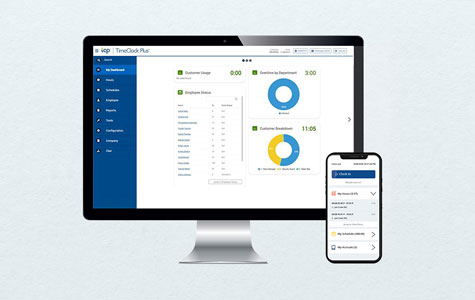Enterprise Resource Planning (ERP) systems promise to be the all-in-one solution for managing your organization’s data and processes. And in many ways, they are.
But what is ERP, exactly?
These systems tie together core business functions like accounting, procurement, HR, and inventory into a single source of truth. Yes, the right ERP system can excel at broad enterprise visibility. But it’s not always equipped to handle every need in your operations, especially for the day-to-day realities of managing people and time.
In this guide, we’ll break down what ERP systems are, how they work, what they do well, and where they start to show cracks.
What is an ERP system?
An Enterprise Resource Planning system is a suite of customizable or integrated applications that help your organization manage its operations.
Rather than relying on a patchwork of siloed tools, ERP puts all the data and workflows across departments in one place. Accounting, procurement, HR, CRM, compliance, supply chain operations — they’re all under one roof. ERP systems are designed to unify workflows and eliminate data silos.
What goes into an ERP system?
Because of the centralization and shared data structure of ERP systems, automated workflows can be built to give a complete picture of processes from start-to-finish. Put simply: ERP functions as the central nervous system of your organization.
For example, a manufacturer using ERP can track the purchase and use of raw materials across the entire supply chain. Every item — from epoxy resins and copper wiring to circuit boards and transistors — can be assigned a part number, supplier ID, cost code, and inventory location.
These data points then drive procurement, budget forecasting, and audit reporting. ERP eliminates ambiguity in these decisions by enforcing naming conventions, categories, and data validation across every touchpoint.
Here are some of the major functional areas typically included in an ERP system:
| ERP Functional Area | Common Capabilities |
| Finance | General ledger, accounts payable and receivable, fixed assets, budgeting, and financial reporting |
| Human resources | Recruiting, onboarding, training, payroll, benefits administration, and employee separation |
| Manufacturing | Bill of materials, work orders, production scheduling, quality control, lifecycle management |
| Supply chain management | Purchasing, inventory control, warehouse management, and supplier coordination |
| Order and sales management | Order processing, pricing, inventory availability, shipping, and sales reporting |
| Project management | Project planning, cost tracking, resource allocation, billing, and time tracking |
| Customer & supplier management | CRM and SRM: sales, service, marketing, supplier records, procurement |
| Contract and compliance | Contract creation, milestone tracking, e-signatures, and compliance auditing |
| Data services | Self-service portals for employees, suppliers, or customers |
| Industry-specific modules | Tools for education, healthcare, construction, or other specialized workflows |
Cloud ERP vs. on-premise ERP
One of the first distinguishing features of an ERP is where it lives — in the cloud or on your servers. Both models offer the core functionality of an ERP, but with different trade-offs of cost, flexibility, and control.
Before selecting a solution, it helps to understand what a cloud ERP system is and how it compares to traditional on-premise deployments.
What is a cloud ERP system?
Cloud ERP systems are hosted on the vendor’s servers and accessed online. They offer organizations the ability to scale resources on demand and access data from anywhere.
Advantages of cloud ERP
- Lower upfront cost (subscription model)
- Easier and faster to deploy
- Accessible from any location or device
- Automatic updates and security patches
Disadvantages of cloud ERP
- Ongoing subscription fees can add up
- Data residency and privacy concerns
- Limited customization compared to on-premise systems
What is on-premise ERP?
On-premise ERP is installed locally on a company’s servers and managed by internal IT teams. It tends to be more customizable and may appeal to organizations with strict data control requirements.
Advantages of on-premise ERP
- Full control over data and infrastructure
- More customizable to specific workflows
- Potentially lower long-term cost
Disadvantages of on-premise ERP
- High upfront investment
- Requires significant IT resources
- Longer implementation timelines
How does an ERP system work?
The purpose of ERP software is to provide a comprehensive, 360-degree view of the ins and outs of your business.
Typically, enterprises are organized as decentralized and siloed systems. Each business unit carries the load for its local data maintenance, which creates inefficiency when data needs to be accessed across the organization.
ERP systems sync data across a shared database accessible to various departments. When one team updates information, like inventory levels or employee hours, that update is visible organization-wide. These systems typically include built-in workflows and approval processes to manage tasks from start to finish.
How many levels does a typical ERP system include?
Most ERP systems include three core layers (DAP):
- Database layer – Where all enterprise data is stored
- Application layer – The business logic and rules that power each module
- Presentation layer – The UI where employees interact with the system
Many ERPs are modular, so you can add capabilities as needed , like finance, HR, inventory, and CRM (customer relationship management) as needed.
How long does it take to implement an ERP system?
ERP implementation can take anywhere from 6 months to 2+ years, depending on your organization’s size, whether you go cloud or on-premise, the number of modules involved, and the amount of data migration required.
Change management, training, and system customization can significantly impact the timeline.
How much does an ERP system cost?
Pricing varies widely. Small business ERP solutions might start at a few hundred dollars per user per month, while enterprise-level platforms can run into the millions. Costs include:
- Software licensing
- Implementation
- Training
- Hardware (for on-prem systems)
- Ongoing IT support
What are the benefits of an ERP system?
Deploying an enterprise resource planning system can be valuable depending on your business needs and model. If your enterprise is considering an ERP, these are a few of the benefits you may be looking for.
A single source of truth for data
Rather than reconciling spreadsheets across departments, everyone pulls from the same real-time dataset. With ERP, there are fewer concerns about how up-to-date, accurate, or complete the data files are, reducing the back and forth.
Simpler processes and operations
ERP can completely automate repetitive processes, such as replying to customer emails, reporting, routine billing, approval management, etc. This helps reduce human error, save time, and allow your staff members to focus on what matters versus menial tasks.
More robust data security
ERP systems replace the need to merge data between departments with a single input system. On-premise ERPs have a great track record with data safety, while cloud-based ERP systems come with round-the-clock specialists to protect data (as their servers are a more formidable target for cyberattacks).
ERPs also grant level- or role-based user permissions, protecting sensitive data internally.
Superior planning and reporting
Dashboards and reports give clearer insight into performance, forecasting, and budgeting. By observing processes through a single system, you can quickly identify bottlenecks and establish more efficient procedures.
Improved collaboration
When data is shared, working across teams becomes smoother. Instead of shifting responsibility and duplicating the administrative burden, ERP systems help departments eliminate decision silos.
Ultimately, the benefits of an ERP system depend on the complexity of your operations and how centralized you want your data and workflows to be.
Where ERP systems fall short
Even the best ERP systems weren’t designed to do everything. When it comes to managing your workforce — like time tracking, scheduling, and labor compliance — you might be looking for the wrong solution in an ERP system.
It’s important to understand not just what an ERP system is, but also what goes into an ERP system — and what it leaves out.
Here’s where ERP systems may not hold up for your use cases:
- Inflexibility around scheduling and time tracking – Most ERPs aren’t built to handle nuanced labor laws, union agreements, or shift-based workforce needs. You might be able to log hours, but things like break enforcement, overtime thresholds, and complex schedules often fall flat.
- Lack of real-time visibility for frontline managers – ERPs prioritize executive reporting, not operational agility. A store or shift manager might need to see who’s clocked in or out right now, not wait for an end-of-day sync or buried report.
- Minimal labor compliance functionality – Compliance with labor laws, especially at the state or regional level, requires systems that can adapt to legal nuance. ERPs typically require heavy customization or third-party plugins to meet those needs.
- Complex implementation for simple use cases – If all you really need is a boost to your time tracking or employee scheduling processes, setting up an ERP module for it may be excessive. High costs, long rollouts, and change fatigue all outweigh the benefits.
- Limited accessibility for hourly employees – ERPs often assume a desk-based user. But most hourly or shift-based workers aren’t sitting at a computer all day. Mobile functionality and ease-of-use tend to be afterthoughts.
Is an ERP system right for you?
ERP systems are incredibly powerful when it comes to unifying operations, compressing workflows, and bringing your data all into one place. But that doesn’t make them one-size-fits-all solutions, especially if managing your workforce is one of your biggest challenges.
Where ERP platforms offer breadth, standalone time and attendance or scheduling systems offer depth. They zero in on the details ERPs tend to miss — real-time labor tracking, ease of use for payroll functions, break compliance, mobile access for field teams, smarter scheduling across multiple roles and locations.
ERP can work as the core record system. But purpose-built time tracking and scheduling solutions fill the real operational gaps that directly impact compliance, payroll accuracy, and day-to-day productivity.
If you’re asking more from an ERP than it was built to deliver, it might be time to rethink whether it’s the right tool for every job.
TCP Software’s employee scheduling and time and attendance solutions have the flexibility and scalability to suit your business and your employees, now and as you grow.
From TimeClock Plus, which automates even the most complex payroll calculations and leave management requests, to Humanity Schedule for dynamic employee scheduling that saves you time and money, we have everything you need to meet your organization’s needs, no matter how unique. Plus, with Aladtec, we offer 24/7 public safety scheduling solutions for your hometown heroes.
Ready to learn how TCP Software takes the pain out of employee scheduling and time tracking? Speak with an expert today.



